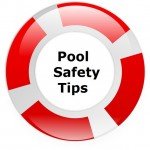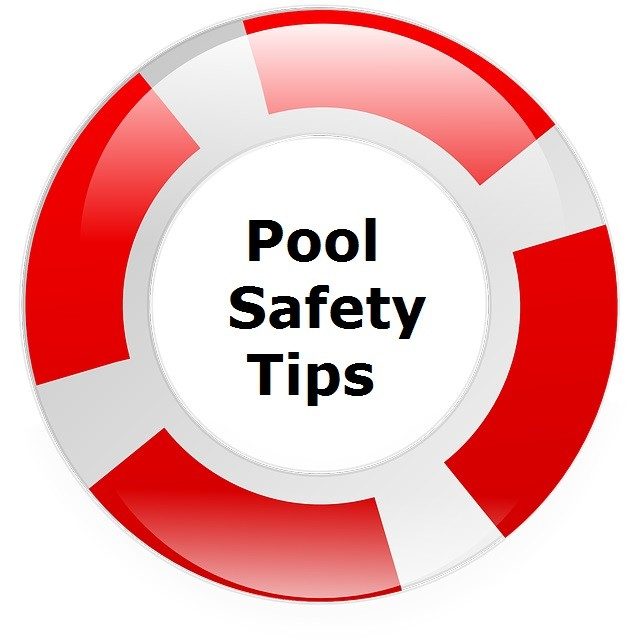 Pool safety is very important to me. When my youngest son was about three, he walked down the steps of our inground pool unnoticed by the adults pool side, including me. Luckily for us, I seen him staring up from under the water with his big blue eyes, and was able to snatch him out before he took a breath.
Pool safety is very important to me. When my youngest son was about three, he walked down the steps of our inground pool unnoticed by the adults pool side, including me. Luckily for us, I seen him staring up from under the water with his big blue eyes, and was able to snatch him out before he took a breath.
On this page you will learn how to protect your family, friends, and neighbors, from swimming pool related accidents. Also things to look out for when your on vacation or visiting at a someone else’s pool. Proper safety equipment and knowledge are the keys to pool safety.
Guardian In The Gate
Even when you have the proper barriers in place, and there are adults present in the pool area, accidents can happen. Normally when children are in the pool, one of the adults should be designated as the active watcher.
But safety measures should also be taken when children are not in the pool, but are in the pool area. This is when my son Daniel wondered into the pool. We came up with a new rule after that incident. Anyone who cant swim, that comes in the pool area, must wear a flotation device (life vest, arm floaties, something…).
The active supervisor should not be texting or otherwise engaged when supervising children in a pool. This means they should have a seat next to the pool, and be directly watching the children at all times. All babysitters, and child guardians should be informed of the rules when minding the children. Not a bad idea to be CPR certified, or have your nanny or sitter certified in case of emergencies. Book mark this page for easy reference (Ctrl + D)
If you ever can’t find a child, check the pool first!
Pool Safety Around Pool Equipment & Supplies
Children should be warned against playing around, or “investigating” pool equipment. While there are are obvious dangers around the pump and filter, water and electricity to name a couple. There are potential hazards in the pool too.
Entrapment is a very real danger in the pool. Keep children away from the skimmer, and the main drain if you have one. Make sure all main drain covers are VGB compliant. VGB compliant drain covers help prevent you from getting stuck to the drain, or getting hair or clothing entangled in the cover.
Most public pools have these VGB covers here in the states, as it is required by law here. But when vacationing outside the states, be extra vigilant. Commercial pool pumps and spas have very strong suction. Also, old residential pools are likely to be non-compliant.
Read more about the Virginia Graeme Baker (VGB) Act here.
Pool Chemicals – Pool Safety
Pool chemicals should always be handled, stored and used properly by people who know what they’re doing. You could easily make mustard gas (chemical warfare agent!), by mixing chlorine and the wrong algaecide (ammonia based). There are many dangerous combinations. You could burn your self with several common pool products. Not to mention the dangers of inhaling D.E. (Diatomaceous Earth), or concentrated chlorine.
Children see you cleaning the skimmer baskets, backwashing or cleaning the filter, and adding chemicals to the water. It is natural for them to want to “play grown-up”, and help out. So remember to keep supplies properly stored and locked up. Kids should not be allowed to handle chemicals, especially chlorine. Always protect skin and eyes while handling liquid chlorine and acids.
Pool Barriers Fencing & Alarms
All fenced in pools should have an automatic locking gate. Pools that can be accessed through the backdoor, should alarm the backdoor, and remain locked. Above ground pool owners should remove pool ladder, or have a means of locking or disabling ladder.
Splasher Pools
Small inflatable, or medium size pools made popular by Intex are extremely dangerous. There are no state safety codes for “temporary pools”, or pools that are disassembled every year. These pools do not usually have any barriers you would commonly associate with inground or standard above ground pools.
These pools should be drained or covered to prevent drowning or other serious injury.
No Running In The Pool Area, Especially On Concrete Decking
Children lose toe-nails, skin knees, and require stitches by smack their heads while running in the pool area. You should always supervise children, in fact no one should swim alone. Children will keep forgetting the rules, and will usually need to be reminded that running in the pool area is dangerous.
No Diving In Shallow Water Or Around Others
To prevent head and neck injuries, children should be advised not to dive or jump into the pool while anyone is in the immediate area, or in water that is not deep enough to prevent injury.
Be Aware Of Weather
It is a new state law that all new pools have a ground installed. Older pools may not have water grounds. Lightning strikes can kill with or without a ground. At the first sign of thunder or lightning evacuate the pool. Do not handle equipment in direct contact with water.
Conclusion
These are common sense tips that prevent accidents and save lives. Be proactive and have a plan when visiting neighborhood pools, public pools, and while vacationing abroad. You can help out, and prevent accidents by making sure your friends and family know these rules. Please use the buttons below to share this article.
Have fun and remember to bring the sun screen.
